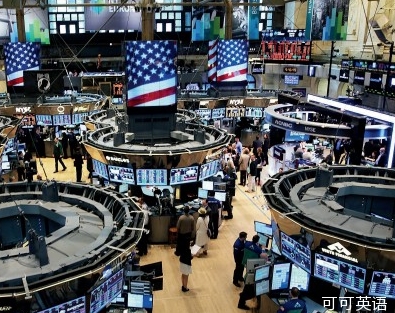(单词翻译:单击)

If you think U.S. stocks are 'safer' than those in foreign countries, you may want to reconsider.
如果你觉得美国股票比其他国家股票“安全”,或许你该重新想一想了。
Research shows that the safest investment portfolio--one with the highest potential return and the lowest risk--is likely to be heavier on international stocks and lighter on U.S. stocks.
研究表明,最安全(潜在回报最高、风险最低)的投资组合可能是轻仓持有美国股票,重仓持有其他国家股票。
Yes, many international stock markets, especially in emerging markets such as Russia and Brazil, have been in turmoil lately. And yes, over the past couple of years, the U.S. stock market has been a great place to be. But short-term performance is a poor basis for long-term investment. The long-term story suggests something quite different.
没错,很多国际股票市场最近经历了动荡,特别是俄罗斯和巴西等新兴市场的股市。同样没错的是,过去几年美国股市是一个不错的投资点。但短期表现不太适合当作长线投资的依据。股市的长期表现给人的是相当不同的启示。
Periodic Rebalancing
定期再平衡
I have lately been on a quest for the perfect 'all weather' investment portfolio, one that needs no more than periodic rebalancing. I accepted that, in addition to assets such as bonds and inflation-protected securities, a big part of that portfolio should be invested in stocks. But then I asked myself: Which stocks? Which markets?
最近我一直在追寻完美的“全天候”投资组合,这种投资组合只需要定期做一下再平衡就可以了。我承认,除了债券和通胀保值证券等资产之外,相当大一部分资金应当投资于股票。不过我又问自己:投哪些股票?投哪些市场的股票呢?
I found myself reading research conducted separately by two investment managers, Joachim Klement, chief investment officer at Wellershoff & Partners, an investment consultancy in Zurich with $10 billion in funds under advisement, and Mebane Faber, CIO at Cambria Investment Management in El Segundo, Calif., which manages $335 million.
我读到了两名投资经理分别进行的研究。他们是苏黎世投资顾问公司Wellershoff &Partners(管理资产规模100亿美元)的首席投资长乔吉姆·克莱门特(Joachim Klement),以及加州埃尔塞贡多(El Segundo)投资管理公司Cambria Investment Management(管理资产规模3.35亿美元)的首席投资长梅班·费伯(Mebane Faber)。
Both men looked at the performance of more than 30 different stock markets around the world over long periods.
两人都考察了全世界30多个不同股市的长期表现。
Among their findings: First, no stock market provided the best return in all periods. On the contrary, the markets of different countries and different regions tended to fare better at different times. (So, for example, Japan did better in the 1980s, the U.S. in the 1990s and emerging markets after 2000.)
他们的发现包括:首先,没有哪个股市在所有时期的回报率都是最高的。相反,不同国家和不同地区的市场往往是在不同的时期有较好的表现。(比如日本表现较好的时候是在80年代,美国是在90年代,新兴市场是在2000年过后。)
Second, performance in the past has depended to a substantial degree on starting valuations. You generally did best by investing in the stock markets that were cheapest in relation to corporate fundamentals such as earnings and net assets--and you generally did worst by investing in those markets which were expensive on those measures.
其次,过去的表现在很大程度上取决于初始估值。投资那些相对于利润和 资产等公司基本面估值最低的股市,总体上表现最好;投资从这些指标看显得很昂贵的市场,总体上表现最差。
Which markets are cheap, and which are expensive, has varied over time, and the performance gaps have been substantial. Over five years or so, those who invested in stock markets when they were very expensive were lucky to break even after counting inflation. But those who invested in markets when they were very cheap often racked up double-digit returns for many years.
哪些市场便宜、哪些市场昂贵,会随着时间的变化而变化,而且投资业绩的差距也是相当大的。在股市非常昂贵的时候投资的人,经过五年左右的时间后,扣除通胀因素,能够不亏不赚就算幸运了。但在股市非常便宜的时候投资的人常常能够多年获得双位数的回报。
This has enormous implications for investors. Far from being safe by sticking to their home market, they would do better to focus on the least-expensive markets and avoid the most expensive.
这对投资者来说有着丰富的含义。他们最好是抛弃坚守本土市场以求安全的办法,侧重于估值最低的市场,避开估值最高的市场。
Taken to extremes, this would mean that today one would invest large amounts in stock markets such as those of Russia, Turkey, Austria, Greece and Indonesia, as they are inexpensive, and very little here in the U.S., which is comparatively expensive on many measures.
极端地说,这意味着如今投资者应当大额投资俄罗斯、土耳其、澳大利亚、希腊和印度尼西亚等估值低的市场,非常少量地投资于美国市场,因为从很多指标来看,美国市场都显得相对昂贵。
It would be a bold investor who took such a gamble. (I wouldn't.) But there are other, less alarming ways of taking advantage of this research.
如此下注的人是勇敢的投资者。(我不会如此下注。)但利用这一研究获利还有其他一些不那么会让人心慌的方法。
A Balanced Approach
均衡方针
One can benefit simply by managing a balanced global portfolio and then adjusting it roughly annually--selling a little of whatever has done best, and buying a little of whatever has done worst--to maintain roughly equal allocations.
获利的方法可以很简单,即维持一个均衡的全球性投资组合,然后大概每年调整一次,也就是卖掉一点表现最好的,买进一些表现最差的,从而使各类配置保持大致均等。
In the past, this strategy would have smoothed returns over time. For example, U.S. investors would have benefited from the stronger performance of European and Asian markets in the 1970s and 1980s, and of emerging markets after 2000.
在过去,这样的策略在经过一定时间过后将会获得平稳的回报。比如美国投资者会因此而受益于70年代至80年代欧亚市场、2000年过后新兴市场的较佳表现。
A portfolio invested equally in the MSCI U.S., European and Pacific indexes, and rebalanced once a year, would have saved U.S. investors from the calamitous slump on Wall Street from 1969 through 1982. Balancing between the U.S., developed markets and emerging markets would have helped them after 2000.
平均投资于摩根士丹利资本国际(MSCI)美国、欧洲和太平洋指数并每年做一次再平衡的投资组合,会使美国投资者躲过从1969年到1982年的华尔街股灾。2000年过后,均衡投资于美国市场、发达国家市场和新兴国家市场会给他们带来好处。
On both occasions, those who stuck solely to U.S. stocks ended up losing purchasing power over many years.
在上面两种情况下,坚持只投资美股的投资者经过多年之后都失去了购买力。
Alas, investing this way is a little harder than you might expect. Most 'global' stock funds are heavily weighted toward stocks, and markets, with the highest values.
可惜如此投资可能要比你想象的难一点。大多数“全球型”股票基金都重仓持有估值最高的股票和股市。
Today a typical global stock fund has about half its money in U.S. stocks and less than 10% in emerging markets. Such funds invest more in a few giant stocks--such as Apple, Google and Microsoft--than they do in most countries. And they won't automatically rebalance in the way one would like. On the contrary, as stock or market X keeps rising, it just becomes a bigger and bigger share of the index.
今天一只典型的全球型股票基金一半左右的资金都是投资于美股,只有不到10%投资于新兴市场。这类基金对几只巨盘股(如苹果(Apple)、谷歌(Google)和微软(Microsoft))的投资超过了对大多数国家的投资。而且它们不会像你希望的那样自动进行再平衡。相反,当某只股票或某个股市不断上涨的时候,它在投资组合中的比例只会越来越大。
What are the alternatives? One could randomly pick, say, 50 stocks from around the world, and invest in them equally. Or one could use exchange-traded funds to invest in five or 10 national markets with (one hopes) low correlations--from Japan to the Middle East, Latin America to Europe. With online stock trades just $8 apiece, these could be reasonably low-cost options.
有何替代途径?可以从全世界随机挑选一些股票,比如说是50只,然后平均投资于这些股票。也可以利用交易所交易基金投资五个或10个相关性低(但愿吧)的国别市场,从日本到中东,从拉丁美洲到欧洲都可以。在网上股票交易八美元一笔的情况下,这些都可能是成本还算低廉的选择。
Mr. Klement says for those who want to keep things simple, his firm often recommends investing equal amounts in low-cost funds tracking five major indexes: the S&P 500, London's FTSE 100 index, Europe's EuroStoxx 50, Japan's Nikkei 225 and the MSCI Emerging Markets index.
克莱门特说,对于不想把问题复杂化的投资者,他的公司常常建议等额投资于跟踪五大股指且费用低廉的基金。这五大股指分别是伦敦的富时100指数(FTSE 100),欧洲的欧元区斯托克50指数(EuroStoxx 50),日本的日经225指数(Nikkei 225),以及摩根士丹利资本国际新兴市场指数(MSCI Emerging Markets)。
This portfolio, rebalanced periodically, 'beats a traditional portfolio by a significant margin over time, ' he says.
他说,这样一个投资组合经过定期再平衡,“一定时间过后的表现明显超出传统投资组合”。
For example, according to MSCI data, from Dec. 31, 1999, through Dec. 31, 2013, this strategy would have produced investment gains of about 70%, compared with less than 50% for U.S. stocks alone.
比如从MSCI数据来看,从1999年12月31日到2013年12月31日,这条策略的投资回报约为70%,相比之下仅投美股的回报率不到50%。


